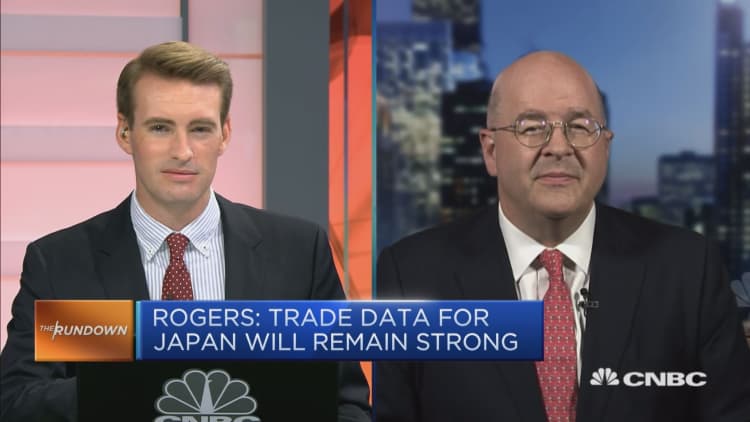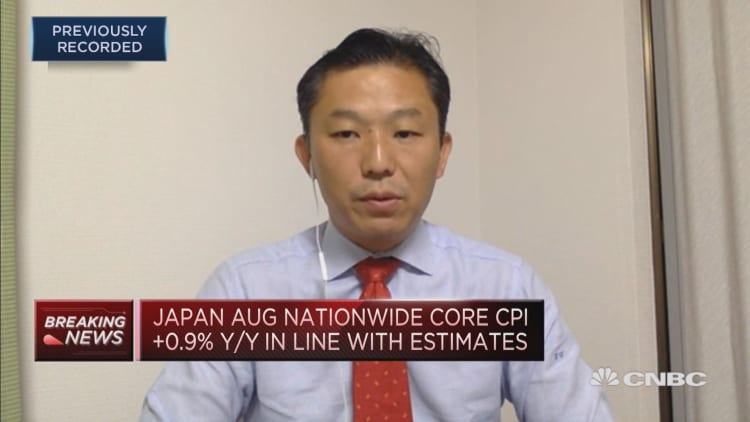Japanese Prime Minister Shinzo Abe, fresh from winning a third term as premier, is expected to walk a fine line when he meets President Donald Trump next week as Tokyo looks to avoid a trade war with the U.S.
Earlier this month, Trump indicated he could impose a 25 percent duty on imports of Japanese vehicles and automotive parts as part of a strategy to reduce U.S. trade deficits with the international community. The move is widely seen as a bargaining tool for Washington to get what it has long sought from Tokyo — a free trade agreement.
However, the world's third largest economy is opposed to a bilateral trade deal and must find other ways to appease Trump, strategists told CNBC.
"I don't think there's any reason not to take [Trump] seriously," said Tobias Harris, vice president at Teneo Intelligence: "So now, Japan has to entertain either some pretty serious market access concessions or enter FTA talks — both things that Japan has tried to avoid since Trump took office."
The matter is expected to dominate Abe's summit with Trump which is slated for Sept. 26 in New York.
The tariffs are considered economically damaging for the Asian giant since passenger cars make up around 30 percent of Japanese exports headed stateside. It's also politically embarrassing for Abe, who has presented himself as someone with close ties to Trump, Harris explained.
If Trump acts on his threats, Abe will find himself in a situation where he has to retaliate with similar measures and that could derail the broader bilateral relationship, said Harris. That's currently the case with Beijing, which has responded to Trump's trade penalties with tit-for-tat measures.
"That situation is obviously something Abe wants to avoid," Harris stated.

Japan has the third largest trade surplus with the U.S. after China and Mexico, according to the census bureau.
"A 25 percent tariff on Japanese car and car parts exports will cut car companies' profits by almost 50 percent," warned Jesper Koll, CEO of WisdomTree Japan KK. "It's a huge external threat that Japan is facing and Trump knows that. He's bargaining from a position of strength."
Abe's options
There are several compromises that Tokyo can offer Washington, experts say.
The U.S. president "wants to look like a winner and the question is what can Abe offer to make Trump look like a winner," Koll said, adding that "Japan has a lot of items in the bag they can offer to make Trump look good."
For one, Tokyo can offer to buy more American imports such as soybeans, beef and defense equipment, Koll said.
A package of agricultural concessions may enable Trump to win points at home for helping out American farmers in the run-up to U.S. midterm elections, Harris said.
"That could be the kind of deal that the Trump administration accepts so they can move onto other issues, particularly because they're trying to put together what looks like a multilateral coalition to take on China at the World Trade Organization," he added.

Abe could also "put together a fund where the Japanese are actually financing U.S. infrastructure investments," Koll stated.
Some analysts were optimistic for a solution given the strong historical ties between the U.S. and Japan.
Their close personal relationship could help alleviate differences on trade policies, the Center for Strategic and International Studies said in a note. Japan also has some bargaining power, the think tank said: "Abe's experience and commitment to strengthening the U.S.-Japan alliance can help shape U.S. policy in the region."
"Abe could highlight Japan's contributions to the U.S. economy and suggest that a bilateral trade dialogue initiated last month serve as the vehicle for addressing any grievances," it added, referring to Aug. 9 talks between Japan's economy revitalization minister Toshimitsu Motegi and U.S. Trade Representative Robert Lighthizer.
For now, some political watchers don't believe Trump will act on his proposed measures just yet.
The president "seems to be more preoccupied with China and his domestic issues," said Takuji Okubo, chief economist at Japan Macro Advisors. "A potential trade war with Japan is relatively low on the agenda so I think Japan is still relatively safe," he added.

